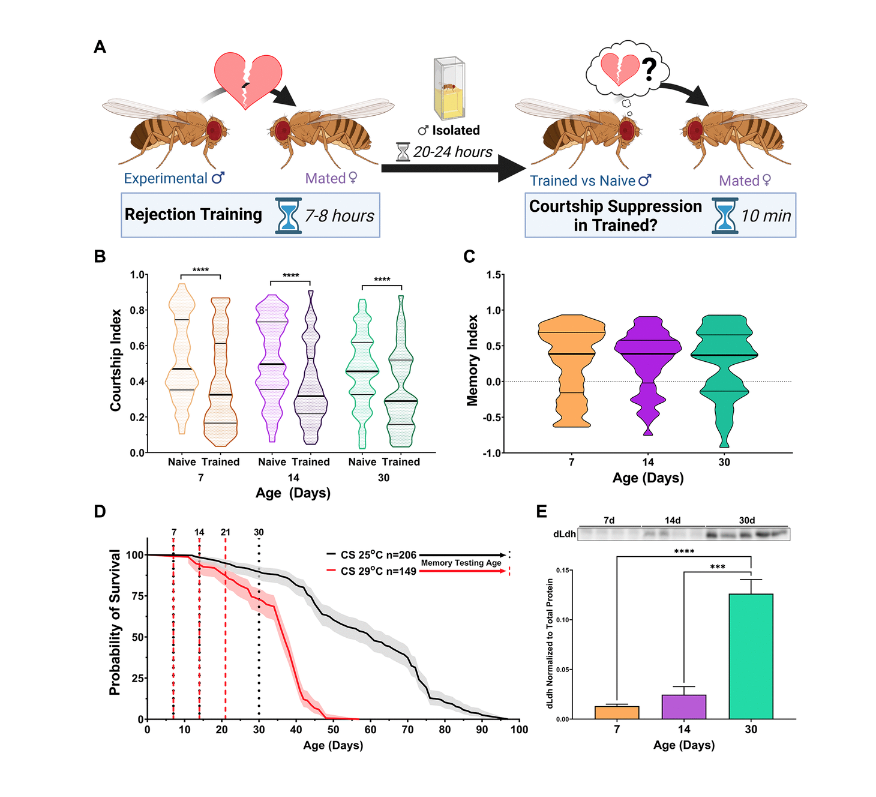Ariel K. Frame, PhD Candidate in the Neuroscience program at Western University, London, Canada, discusses a research paper he co-authored that was published by Aging (Aging-US) in Volume 15, Issue 4, entitled, “Aging and memory are altered by genetically manipulating lactate dehydrogenase in the neurons or glia of flies.”
Behind the Study is a series of transcribed videos from researchers elaborating on their recent studies published by Aging (Aging-US). Visit the Aging (Aging-US) YouTube channel for more insights from outstanding authors.
—
My name’s Ariel Frame. I’m a PhD candidate in the neuroscience program here at Western University. I’m supervised by Robert Cumming and mentored by Anne Simon in the biology department. Our new paper in Aging is a study looking at lactate metabolism in relationship to aging and memory in Drosophila melanogaster. In this study, we manipulated lactate dehydrogenase expression in neurons and glia, and then we tested memory using core chip conditioning. In addition, we did some molecular analysis looking at lipids and metabolites via GCMS, which was done in collaboration with Jason Tennessen at Indiana University.
The motivation to embark on this study was that there is a connection between the astrocyte neuron lactate shuttle, and long-term memory that had previously been found in rodents, but hadn’t been studied in invertebrate models like Drosophila melanogaster. What had been found by Stefanie Schirmeier‘s group in Germany was that glialglycolysis is important for neuronal survival and that glia release lactate, so there is a possibility based on that finding that there’s an astrocyte neuron lactate shuttle-like phenomena happening in flies. What we wanted to do was manipulate that and see what happens with memory. In addition, astrocyte neural lactate shuttle connection with memory hadn’t been studied in the context of aging, so we wanted to add that piece using their powerful model that Drosophila melanogaster is.

What did we find in this study? Well, in order to determine how memory changes with age, we first have to know using this assay, courtship conditioning, whether memory normally changes with age in non-trans genetic flies. We looked at courtship conditioning across age in cantons non-trans genetic flies, and found that interestingly, it doesn’t decay with age. Now this is different than other olfactory-based memory tests in flies that do decay with age. With that basis, we then looked at memory across age in flies with manipulated lactate dehydrogenates, and what we found was that with neurons, when you either increase or decrease lactate metabolism, you actually have worse memory with age. Whereas in glial cells, what we found was only when you reduce lactate dehydrogenates in glial cells do you have age-related memory impairment. This was interesting that not only did we find a connection between lactate metabolism and memory in flies, we also found that it was age-dependent.
In the future, we’d like to see studies that build off the findings of our study by digging a little bit deeper into which specific sub-cell types of glia and neurons in their connection with lactate metabolism and memory and aging. That would include glial subtypes like ensheathing glia, cortex glia, -like glia, in addition to subtypes of neurons like GABAergic, glutamatergic, cholinergic, dopaminergic, as well as neurons located in particular brain regions. In addition, it would be interesting for future studies to look into the causative connection of some of the metabolic changes we saw, including changes in 2-hydroxyglutarate and accumulation of neutral lipids that we saw building up in the brain of flies with increased lactate metabolism.
This study was done with support from the National Sciences and Engineering Research Council of Canada, in addition to the National Institute of General Medical Sciences in America. I’d also like to thank Jamie Kramer, Dalhousie University, for helping us with the courtship conditioning assay.
Click here to read the full study published by Aging (Aging-US).
—
Aging (Aging-US) is an open-access journal that publishes research papers bi-monthly in all fields of aging research and other topics. These papers are available to read at no cost to readers on Aging-us.com. Open-access journals offer information that has the potential to benefit our societies from the inside out and may be shared with friends, neighbors, colleagues, and other researchers, far and wide.
For media inquiries, please contact [email protected].